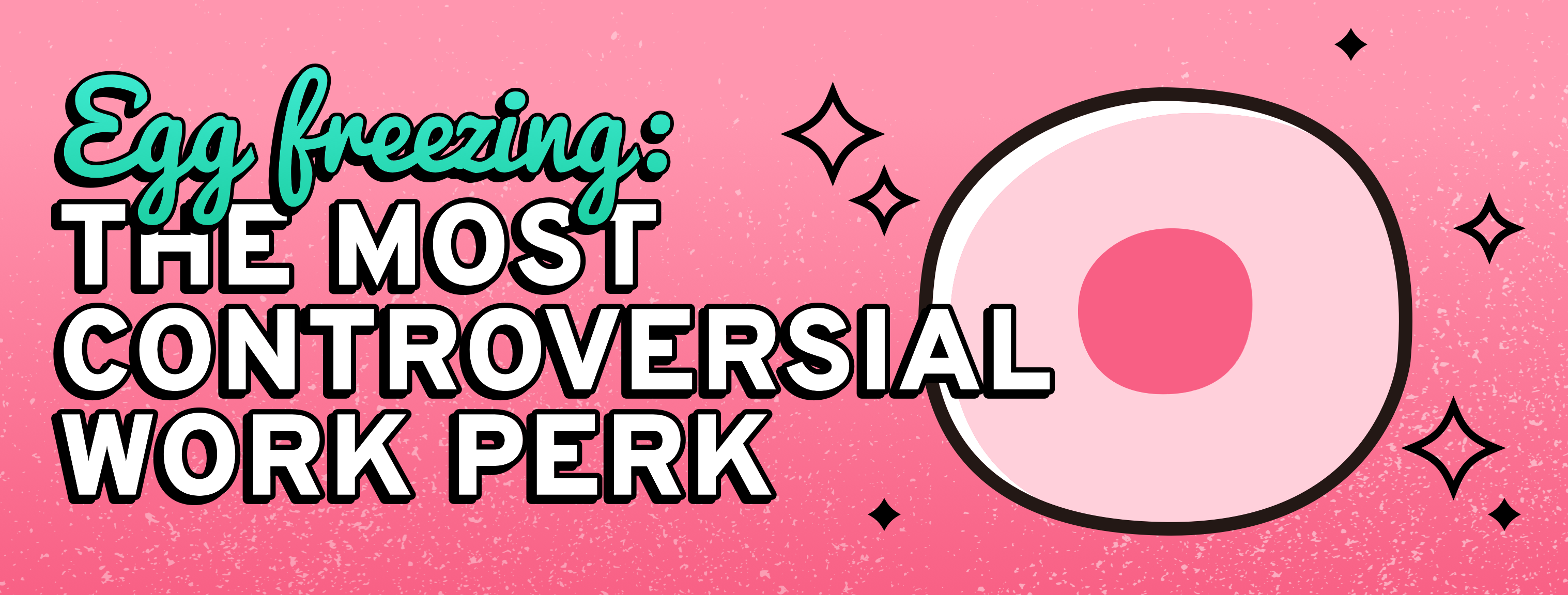Egg Freezing: The Most Controversial Work Perk
13th Apr 2023

The demand for egg freezing has grown over recent years to help preserve fertility and give women more options for when and how to have children. More women are choosing to have children later on in life for a range of reasons. It’s great that women have more choices around starting a family, but the costs associated with egg freezing can create a financial burden that deters women. This means that many women are stuck with a difficult choice: have children before they are ready, or risk complications down the line.
Companies such as Linkedin, Netflix, Spotify, Salesforce, Deloitte and many others are offering to their female employees as part of a healthcare packageThis makes an expensive, time-consuming procedure not only more affordable but also supported by the workplace.
Offering egg freezing as a work perk gives women more control over when or whether they choose to have a child/children - whilst enabling them to balance career, personal and family goals. It might mean that talent retention is higher, that women feel more supported by their employers, and that helps to reduce the burden women can feel about making a choice before they are ready to.
Freezing your eggs at a younger age can help to increase the chances of having a healthier pregnancy later in life. It can be particularly important for those who want to focus on their careers in their 20s or 30s or who simply aren’t yet ready to have children!
What’s controversial about offering egg freezing as a work benefit?
The controversy stems from a few reasons. One is that it sends the message to women that they should prioritise their career over starting a family and that to advance in their career, they should put their personal life on hold.
Others would argue that offering egg freezing as a work perk doesn’t tackle the larger problem of gender inequality within the workplace. Instead, there should be a focus on supporting women and implementing policies such as offering flexible working, parental leave and affordable childcare.
The ability to freeze eggs is a privilege that not everyone may be able to have access to. It’s unlikely that jobs with lower salaries can offer this benefit, which could entrench wealth inequality and amplify other existing disparities present in the workplace.
Despite the controversy, there are plenty of advantages too. Let’s unpack this in a little more detail..
The advantages of egg freezing as a work benefit
Offering egg freezing as a workplace benefit can have its advantages for both employers and employees; this includes:
- Retention of female employees - offering egg freezing as a work benefit can be a highly valuable retention tool for employers who want to attract and retain women. By providing this benefit, employers can help demonstrate their commitment towards supporting women's careers and family goals.
- Increased flexibility - egg freezing can give women more flexibility around their family planning decisions, enabling them to focus on their careers (or other aspects of their personal life, like travelling or working abroad!) during their younger years without sacrificing their ability to have children in the future.
- Improved career opportunities - By freezing eggs at a younger age, women can increase their chances of having healthy pregnancies later in life. Doing so can enable them to pursue career opportunities without worrying about the ‘biological clock’ or suffering from health issues later on.
- Greater gender equality - offering egg freezing as a work benefit can help to reduce the impact of gender discrimination, providing opportunities for women to achieve a higher status and better pay.
- Enhanced employee morale - it can have an impact in boosting employee morale and engagement, as women will feel less pressure with starting a family and won’t have to worry about the financial burden of freezing their eggs.
Concerns around offering egg freezing as a work benefit
Despite the many positives offering egg freezing as a work benefit raises several concerns, including;
- Reinforcement of gender stereotypes - some might argue that offering egg freezing as a work perk reinforces the stereotype that women must choose between their careers and starting a family.
- Lack of access - whilst some employers may cover the cost of egg freezing as a work perk, not all women would have access to it, which could amplify existing inequalities in the workplace.
- Ethical concerns - there are ethical concerns around the long-term health effects of egg freezing due to the potential risks of delaying pregnancy until later in life. There is also a risk that women may undergo the procedure without fully understanding the risks and benefits.
- Insufficient support for working mothers - some might argue that companies should focus on implementing policies that support women throughout their careers, offering flexible working arrangements, parental leave, and affordable childcare.
- Misuse of resources - it could be argued that offering egg freezing as a work benefit could be considered a misuse of company resources; with the cost of the procedure being high, this could be spent on implementing other benefits that may be more beneficial to the broader team.
It’s clear to see why egg freezing raises ethical concerns, but on the other hand, it’s a great benefit for women who would prefer to have children later in life whilst focusing on themselves during their 20s and 30s. It’s difficult to definitively say whether companies are wrong or right to offer this workplace benefit.
We do, however, believe that offering flexible working benefits, including egg freezing, can have a positive impact on the broader team for those who have children and also those that don’t. It’s a benefit that can be appreciated and understood by everyone and can create long-lasting positive impacts on morale, happiness and productivity.